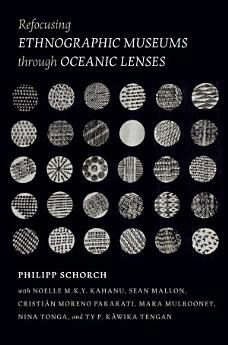Refocusing Ethnographic Museums through Oceanic Lenses
Philipp Schorch
Apr 2020 · University of Hawaii Press
E-Book
316
Seiten
family_home
Zulässig
info
reportBewertungen und Rezensionen werden nicht geprüft Weitere Informationen
Über dieses E-Book
Refocusing Ethnographic Museums through Oceanic Lenses offers a collaborative ethnographic investigation of Indigenous museum practices in three Pacific museums located at the corners of the so-called Polynesian triangle: Bernice Pauahi Bishop Museum, Hawai‘i; Museum of New Zealand Te Papa Tongarewa; and Museo Antropológico Padre Sebastián Englert, Rapa Nui. Since their inception, ethnographic museums have influenced academic and public imaginations of other cultural-geographic regions, and the often resulting Euro-Americentric projection of anthropological imaginations has come under intense pressure, as seen in recent debates and conflicts around the Humboldt Forum in Berlin, Germany. At the same time, (post)colonial renegotiations in former European and American colonies have initiated dramatic changes to anthropological approaches through Indigenous museum practices. This book shapes a dialogue between Euro-Americentric myopia and Oceanic perspectives by offering historically informed, ethnographic insights into Indigenous museum practices grounded in Indigenous epistemologies, ontologies, and cosmologies. In doing so, it employs Oceanic lenses that help to reframe Pacific collections in, and the production of public understandings through, ethnographic museums in Europe and the Americas.
By offering insights into Indigenous museologies across Oceania, the coauthors seek to recalibrate ethnographic museums, collections, and practices through Indigenous Oceanic approaches and perspectives. This, in turn, should assist any museum scholar and professional in rethinking and redoing their respective institutional settings, intellectual frameworks, and museum processes when dealing with Oceanic affairs; and, more broadly, in doing the “epistemic work” needed to confront “coloniality,” not only as a political problem or ethical obligation, but “as an epistemology, as a politics of knowledge.” A noteworthy feature is the book’s layered coauthorship and multi-vocality, drawing on a collaborative approach that has put the (widespread) philosophical commitment to dialogical inquiry into (seldom) practice by systematically co-constituting ethnographic knowledge. Further, the book shapes an “ethnographic kaleidoscope,” proposing the metaphor of the kaleidoscope as a way of encouraging fluid ethnographic engagements to avoid the impulse to solidify and enclose differences, and remain open to changing ethnographic meanings, positions, performances, and relationships. The coauthors collaboratively mobilize Oceanic eyes, bodies, and sovereignties, thus enacting an ethnographic kaleidoscopic process and effect aimed at refocusing ethnographic museums through Oceanic lenses.
By offering insights into Indigenous museologies across Oceania, the coauthors seek to recalibrate ethnographic museums, collections, and practices through Indigenous Oceanic approaches and perspectives. This, in turn, should assist any museum scholar and professional in rethinking and redoing their respective institutional settings, intellectual frameworks, and museum processes when dealing with Oceanic affairs; and, more broadly, in doing the “epistemic work” needed to confront “coloniality,” not only as a political problem or ethical obligation, but “as an epistemology, as a politics of knowledge.” A noteworthy feature is the book’s layered coauthorship and multi-vocality, drawing on a collaborative approach that has put the (widespread) philosophical commitment to dialogical inquiry into (seldom) practice by systematically co-constituting ethnographic knowledge. Further, the book shapes an “ethnographic kaleidoscope,” proposing the metaphor of the kaleidoscope as a way of encouraging fluid ethnographic engagements to avoid the impulse to solidify and enclose differences, and remain open to changing ethnographic meanings, positions, performances, and relationships. The coauthors collaboratively mobilize Oceanic eyes, bodies, and sovereignties, thus enacting an ethnographic kaleidoscopic process and effect aimed at refocusing ethnographic museums through Oceanic lenses.
Autoren-Profil
Philipp Schorch is a professor of museum anthropology at Ludwig-Maximilians-Universität in Munich, Germany, where he leads the ERC-funded project Indigeneities in the 21st Century.
Dieses E-Book bewerten
Deine Meinung ist gefragt!
Informationen zum Lesen
Smartphones und Tablets
Nachdem du die Google Play Bücher App für Android und iPad/iPhone installiert hast, wird diese automatisch mit deinem Konto synchronisiert, sodass du auch unterwegs online und offline lesen kannst.
Laptops und Computer
Im Webbrowser auf deinem Computer kannst du dir Hörbucher anhören, die du bei Google Play gekauft hast.
E-Reader und andere Geräte
Wenn du Bücher auf E-Ink-Geräten lesen möchtest, beispielsweise auf einem Kobo eReader, lade eine Datei herunter und übertrage sie auf dein Gerät. Eine ausführliche Anleitung zum Übertragen der Dateien auf unterstützte E-Reader findest du in der Hilfe.








